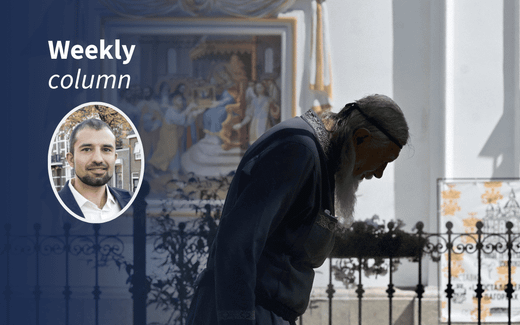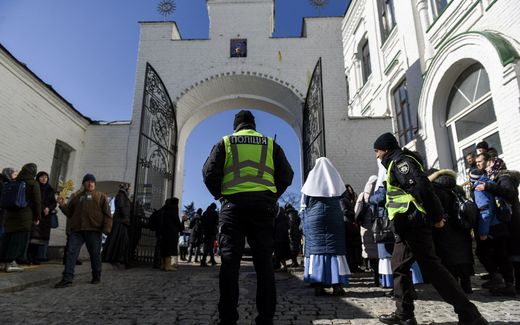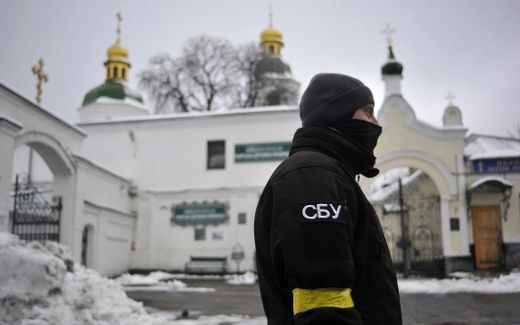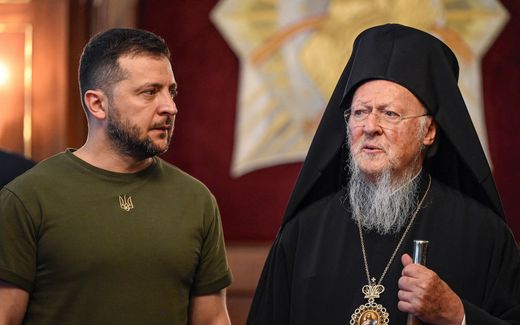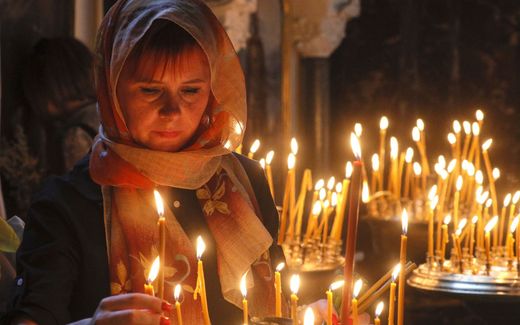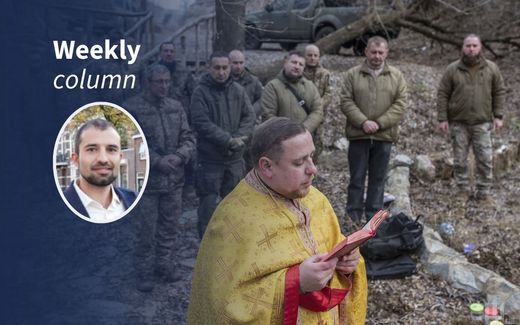Six questions why Kyiv struggles with Ukrainian Orthodox Church
18-07-2025
Eastern Europe
William Immink, CNE.news
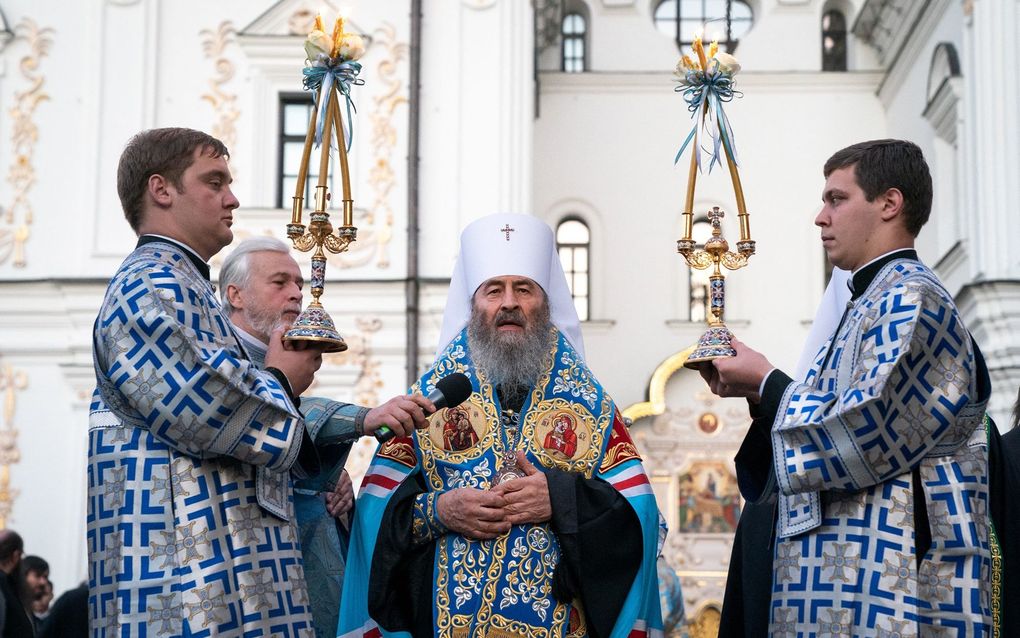
Metropolitan Onufriy (centre), head of the Ukrainian Orthodox Church of Moscow Patriarchy, conducts a prayer for peace in the Kiev-Pechersk Lavra monastery, the headquarter of the Ukrainian Orthodox Church of Moscow Patriarchy, in Kyiv. Photo AFP, Volodymyr Shuvayev
Eastern Europe
Ukraine stripped the highest metropolitan of the largest Ukrainian Orthodox Church of his citizenship for alleged ties with Russia. It is the newest low in a long-lasting conflict between the state and the church.
Stay up to date with Christian news in Europe? Sign up for CNE's newsletter.
Ukrainian President Zelensky stripped Metropolitan Onufriy of his Ukrainian citizenship. Onufriy is head of the Ukrainian Orthodox Church (Moscow Patriarchate, UOC-MP). The move marks a new low in the conflict between the two Orthodox Churches in Ukraine and illustrates the government’s position in the struggle.
The drastic measure, which has deeply unsettled Ukraine’s Orthodox community, follows accusations by the SBU (Security Service of Ukraine) that the Onufriy obtained a Russian passport in 2002 – allegedly without notifying Ukrainian authorities at the time.
Metropolitan Onufriy (born under the name of Orest Berezovsky) denies the claims, insisting he holds only Ukrainian citizenship.
Six questions about the recent crackdown.
1. Why are there two Orthodox Churches in Ukraine?
Orthodox Christianity is the main religion in modern-day Ukraine. It has been so since the baptism of Rus by Prince Vladimir the Great in the year 988 A.D. For many centuries, the dominant church in Ukraine was the Ukrainian Orthodox Church (UOC), which was linked to the Moscow Patriarchate led by Patriarch Kirill (Gundayev).
Such a connection within the Orthodox church family is purely canonical (formal); in practice, the national churches are independent. This is different from the Roman Catholic Church. But still, the official name of the UOC is sometimes extended with MP: Moscow Patriarchate, to make clear which Orthodox church in Ukraine we speak about (UOC-MP).
Because of the Russo-Ukrainian war that has been going on since 2014, the other Orthodox Church of Ukraine (the OCU) has been under growing political and societal fire.
This ‘rival’ is the Orthodox Church of Ukraine (OCU), founded in 2018 by then-President Petro Poroshenko. His campaign slogan —“one language, one nation, one church”— became a reality. He established the OCU through a merger of various Orthodox factions, which in 2019 received recognition (autocephaly) from the Patriarchate of Constantinople. The OCU is in contact with this Patriarchate.
The two Patriarchates have been locked in conflict.
Poroshenko’s dream of creating an Orthodox church “without Putin and Kirill” came true. The Moscow Patriarchate, led by Patriarch Kirill, considers Onufriy’s church the only canonical Orthodox church in Ukraine and severed ties with Constantinople in response. Since then, the two Patriarchates have been locked in conflict.
2. What is the role of the Ukrainian authorities in the church conflict?
In recent years, Ukrainian authorities have increasingly cracked down on Onufriy’s UOC-MP. The issue is that this church, which for centuries has been in connection with the Moscow Patriarchate, still officially prays for the Russian patriarch, who fervently supports the Russian invasion of Ukraine. Furthermore, many clergy people –including Onufriy himself– were trained in Moscow and still have many contacts there. It’s no surprise, then, that priests within this system are viewed with suspicion in Ukraine. After all, no one knows precisely how far the Kremlin’s influence truly reaches.
On the day of the Russian invasion of Ukraine in February 2022, Metropolitan Onufriy immediately condemned the attack. Since then, the UOC has been supporting the Ukrainian army consistently.
To ease societal and political pressure, Metropolitan Onufriy declared his church formally autonomous from the Moscow Patriarchate in May 2022, shortly after the start of Russia’s “special military operation.”
However, full autonomy requires permission from Moscow, which the UOC-MP never received. Therefore, Onufriy's declaration of autonomy is invalid in theory. Besides that, liturgical and theological ties have remained strong. To Kyiv’s authorities and Ukrainian nationalists, these ongoing links to Moscow make the church “suspicious.”
3. Are pro-Russian media rightfully claiming Ukraine is “persecuting faith”?
Priests within Onufriy’s church claim they are being “persecuted” for their faith. In September 2024, a new, controversial law went into effect. Since then, churches under the Moscow Patriarchate can be forcibly closed. Hundreds of parishes have already transferred to the Orthodox Church of Ukraine (OCU), often under pressure from local authorities. Clergy from the UOC-MP face prosecution for alleged collaboration with Russia – and now, the highest-ranking church leader himself has become a target.
Russia, naturally, has condemned the revocation of Onufriy’s citizenship as “religious persecution” and an “attack on millions of believers”. Supporters of the Moscow-linked church in Ukraine point out that Onufriy has lived and worked in Ukraine his entire life. Meanwhile, many Ukrainian nationalists argue it’s high time for “de-Russification” to extend into the religious sphere.
4. Which of the two churches is ‘winning’?
Before the war, the UOC-MP had more than 12,000 parishes. However, the church has been losing many of them since the “special military operation” started in February 2022. According to Ukrainian sources, a little over 1850 parishes have already left the UOC-MP for the UOC.
The OCU is gaining popularity, not so much through winning the hearts and minds of the Ukrainian people as through court orders and the government’s support. If Ukraine wins the war, this church will most likely reap the benefits because it is more “politically correct” than the other.
The motives behind the political support for the OCU go beyond just religious, nationalistic or ideological reasons, critics say. Economic interests also play a role: many churches under the Moscow Patriarchate are highly valuable. Hundreds of historic churches and monasteries, including the famous Kyiv-Pechersk Lavra, remain under control of Patriarch Kirill. Though the Orthodox Church of Ukraine is the smaller of the two, it has the political leverage to seize these assets.
5. What is the role of politics in this church conflict?
The whole religious conflict in Ukraine is completely politicised. Separation of church and state is a Western concept that does not function the same in the Slavonic world.
The creation of the Orthodox Church of Ukraine (OCU) in 2018 in itself was the result of presidential policy. And although Zelensky spoke out against this church policy during his campaign for the presidency in 2019, he has been discrediting the UOC-MP himself for a few years now.
This is a challenge for Ukraine's Western allies. Some human rights bodies have been reminding Kyiv to stay out of church conflicts, but so far, these attempts have not been successful.
6. What is the future of Orthodox Christianity in a country like Ukraine?
The church conflict mirrors Ukraine’s broader tensions. The “special military operation” was partly triggered by language laws, forcing the Russian-speaking population in Ukraine to use Ukrainian in schools and government. On the one hand, Russian-speaking Ukrainians feel pressured. On the other hand, nationalists push for a church free of Russia’s influence.
What will happen to Onufriy’s church if he is forced to leave the country?
A significant portion of the population still visits traditional Ukrainian Orthodox churches that fall under Onufriy’s responsibility. Now, with the metropolitan unable to perform his duties without a Ukrainian passport, there seems little room for reconciliation.
The future of Orthodoxy in Ukraine hangs in the balance. What will happen to Onufriy’s church if he is forced to leave the country? And what lies ahead for the state-backed Orthodox Church of Ukraine, which expands with government support? Most crucially, how many devout believers will find these religious battles shameful and embarrassing and will turn away from the church —and God— altogether?
Related Articles

